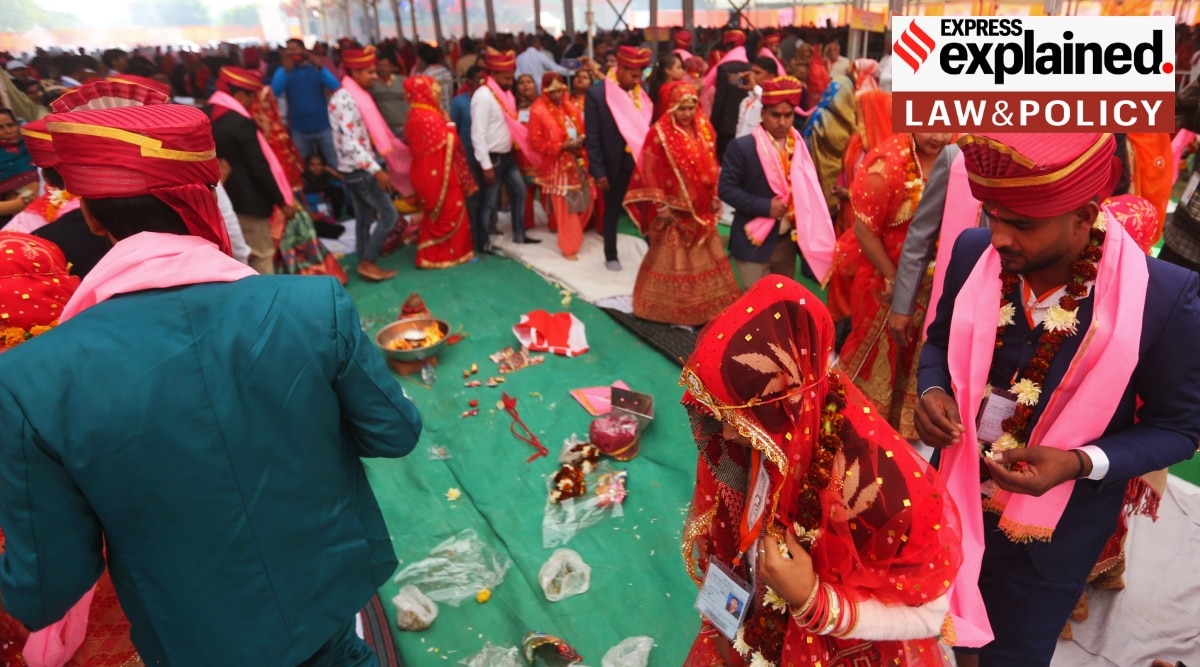Law Commission seeks views on Uniform Civil Code: What is the UCC and the debate around it
What is a Uniform Civil Code? What is the controversy surrounding it? Why has the Opposition criticised the Law Commission in this case? We explain.
 A mass wedding ceremony held in Uttar Pradesh's Ghaziabad in 2022. As Marriages are currently governed by personal laws which vary from community to community. (Express photo by Gajendra Yadav)
A mass wedding ceremony held in Uttar Pradesh's Ghaziabad in 2022. As Marriages are currently governed by personal laws which vary from community to community. (Express photo by Gajendra Yadav) The 22nd Law Commission of India Wednesday (June 14) sought the views of religious organisations and the public on the issue of a Uniform Civil Code (UCC).
The Commission is chaired by former Karnataka High Court Chief Justice Ritu Raj Awasthi. Retired High Court judge Justice K T Sankaran, Professor Anand Paliwal, Professor D P Verma, Professor Raka Arya and M Karunanithi are its members.
A notice issued by the Commission said those interested and willing may present their views within 30 days.
This comes eight months after the Centre told the Supreme Court that the Constitution obligated the State to have a UCC for its citizens, saying that people of different religions and denominations following different property and matrimonial laws was an “affront to the nation’s unity”.
Responding to petitions before the Supreme Court for uniformity in laws governing matters of divorce, succession, inheritance, adoption and guardianship, the Centre, in October 2022, had told the apex court that the Constitution obligated the State to have a UCC for its citizens. It had also submitted that the matter would be placed before the 22nd Law Commission.
Why has the Opposition opposed the move?
The Congress has led the charge against the move, saying the 21st Law Commission had said that it is “neither necessary nor desirable at this stage” to have a Uniform Civil Code. The Congress told the 22nd Law Commission that it should remember that the interests of the nation are distinct from the political ambitions of the BJP.
The JD(U), RJD, the Left and the Trinamool Congress have also slammed the Government over the move. However, the Sena (UBT) and the AAP, parties who have previously voiced support for a UCC, have remained silent.
What did the 21st Law Commission say on the matter?
Underlining that the Uniform Civil Code is “neither necessary nor desirable at this stage”, the 21st Law Commission of India, in 2018, argued for reform of family laws of every religion through amendments and codification of certain aspects so as to make them gender-just.
In its ‘Consultation Paper on Family Law Reforms’, the Law Commission took a stand in favour of “equality ‘within communities’ between men and women” (personal law reform), “rather than ‘equality between’ communities” (UCC).
“Cultural diversity cannot be compromised to the extent that our urge for uniformity itself becomes a reason for threat to the territorial integrity of the nation,” the paper said, emphasising that celebration of the diversity of Indian culture must not disprivilege specific groups. It further noted that “women must be guaranteed their freedom of faith without any compromise on their right to equality” as it would be unfair to make women choose between one or the other.
The current Law Commission’s directive on the issue, while not making any recommendations, again raises the matter.
“It is strange that the Law Commission is seeking a fresh reference, when in its press release it acknowledges that its predecessor, the 21st Law Commission, had published a consultation paper on the subject in August 2018. No reasons are given for why the subject is being revisited, except for vague references to the relevance and importance of the subject, and also to various court orders,” said Congress communication head Jairam Ramesh.
What is Uniform Civil Code?
A UCC would provide for one law for the entire country, applicable to all religious communities, in their personal matters such as marriage, divorce, inheritance, adoption etc.
Currently, Indian personal law is fairly complex, with each religion adhering to its own specific laws. Separate laws govern Hindus including Sikhs, Jains and Buddhist, Muslims, Christians, and followers of other religions.
As Faizan Mustafa, expert of constitutional law, earlier wrote for The Indian Express, “Moreover, there is diversity even within communities. All Hindus of the country are not governed by one law, nor are all Muslims or all Christians. For instance, in the Northeast, there are more than 200 tribes with their own varied customary laws. The Constitution itself protects local customs in Nagaland. Similar protections are enjoyed by Meghalaya and Mizoram. Even reformed Hindu law, in spite of codification, protects customary practices.
The exception to this rule is the state of Goa, where all religions have a common law regarding marriages, divorces, and adoption.
What does the Constitution say about a UCC?
Article 44 of the Constitution lays down that the state shall endeavour to secure a UCC for citizens throughout the territory of India.
Article 44 is among the Directive Principles of State Policy. Directive Principles are not enforceable by court, but are supposed to inform and guide governance.
“However, in some senses, Article 44 is unique in this manner. While Article 44 uses the words “state shall endeavour”, other Articles in the ‘Directive Principles’ chapter use words such as “in particular strive”; “shall in particular direct its policy”; “shall be obligation of the state” etc. Furthermore, the phrase “by suitable legislation” is absent in Article 44. All this implies that the duty of the state is greater in other directive principles than in Article 44,” Mustafa wrote.
Why is there no uniform code for personal law?
Article 25 lays down an individual’s fundamental right to religion; Article 26(b) upholds the right of each religious denomination or any section thereof to “manage its own affairs in matters of religion”; Article 29 defines the right to conserve distinctive culture. An individual’s freedom of religion under Article 25 is subject to “public order, health, morality” and other provisions relating to fundamental rights, but a group’s freedom under Article 26 has not been subjected to other fundamental rights.
“I would also urge the Law Commission to go back to the Constituent Assembly debates,” RJD Rajya Sabha member Manoj Kumar Jha told The Indian Express. Jha argued that the reason why the Assembly did not implement a UCC was the “mistrust” between different communities. He said that in an India where such mistrust and enmity has not been resolved, a UCC would only deepen the divides.
So, what’s next?
Over the next 30 days, the Law Commission will receive views of the public and stakeholders.
The notice said the stakeholders concerned are at liberty to make submissions in the form of consultation/discussion/working papers on any of the issues pertaining to the UCC to the Member Secretary, Law Commission of India. “If need be, the Commission may call upon any individual or organisation for a personal hearing or discussion,” it said.
After reviewing the submissions, the Law Commission will again make observations/recommendations regarding a UCC, which may or may not differ from the previous Commission’s observations.
On the political front, the UCC issue has been at the core of the Bharatiya Janata Party’s agenda for decades. It has frequently cited Article 44 to support its case. With the upcoming 2024 General Elections, BJP is likely to vocally raise the issue once again.
- 01
- 02
- 03
- 04
- 05






































